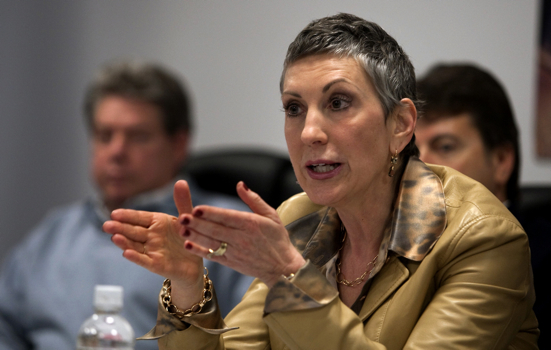Carly Fiorina is probably the most high-profile candidate in the 2010 California senate race — perhaps even more than three-term incumbent Sen. Barbara Boxer (D). Â She’s routinely profiled in national publications; her statements, good and bad, are quickly written up by almost every campaign reporter. Â Indeed, Fiorina is so ubiquitous on the media radar that you could be forgiven for not realizing that she probably won’t even make it to the general election.
Fiorina has stumbled, and now is a consistent second place candidate as the June 8 California GOP Senate primary fight shifts into high gear. Yet even as it’s becoming increasingly clear that Carly Fiorina is not the candidate to watch, it’s likely you’ve haven’t heard much about the man she’s losing to, or why she’s failing to excite voters in California.
Sandwiched between a tea party-backed veteran on the right, and a pro-choice perennial candidate on the left, the woman who seemed poised to take the national political stage at the end of the presidential race seems destined to end 2010 as an also-ran. Despite her fortune, and her seasoning on the stump for John McCain, polling shows she’s not making the connection with voters many expected.
Republicans will face Sen. Barbara Boxer in November at a time that most think the three-term Democrat is at her weakest. Some thought that Fiorina’s gender would give her an edge past opponents never had. But it’s starting to look like they won’t get a chance to test the theory.
The change in Fiorina’s fortunes came in January, when former Rep. Tom Campbell dropped out of the gubernatorial race (where another female CEO, ex-eBay chief Meg Whitman, seems set to win the nomination) in favor of a run for Senate. Almost immediately, polls that showed Fiorina leading the field of four showed her running second to Campbell.
Campbell’s entrance made the GOP field five, but the only candidates in real contention are Fiorina, Campbell and ex-Assemblyman Chuck DeVore — a tea party darling with the support of Sen. Jim DeMint (R-SC). The TPM Poll Average of that race shows Campbell with 28.7%, Fiorina with 20.2% and DeVore with 12.4%.
Nationally, Republicans say it’s too early to count Fiorina out, but the polls have held this way for months, despite a stepped up negative campaign by Fiorina that tried to portray Campbell as some kind of hideous, sheep-like creature.
Despite her standing as the second place candidate in the race, much of the national focus on California has kept Fiorina firmly in the spotlight. She entered the stage as a national figure — an A-list surrogate for John McCain — and it seems the media has found it hard to let go of that narrative. Her national ambition was clear in 2008: As the former CEO of Hewlett-Packard, she was often hailed as the economic expert on the McCain team (though that ended when she told a reporter that neither McCain nor Sarah Palin could “run a major corporation”). Before Palin made her debut, Fiorina was touted as a surprise female vice presidential pick that could add some life to the McCain camp.
But on the trail in California, Fiorina has lost much of that sheen. Though she has tried to run as a conservative, she’s not as conservative as DeVore. And she can’t out-moderate Campbell, who is pro-choice and went public with his opposition to California’s Proposition 8. She hasn’t found a way to portray herself as the best of those two worlds.
And, ironically Fiorina has largely shied away from playing the gender card on the primary campaign trail, which in the eyes of many Republicans was her strongest asset against Boxer. The Democrat has never faced a woman in a general election, and there was talk that Fiorina could steal some of Boxer’s traditional support among women. But Fiorina hasn’t talked up that storyline much with California Republicans. As the Los Angeles Times reports, Fiorina’s “struggles as a female business executive have not been a central focus in her campaign…[i]nstead she has tried to portray herself as tough-minded corporate leader eager to tackle job creation issues in Washington.”
There are signs that she’s changing that message, posing in the kitchen with her husband in a new Wall Street Journal magazine profile. And she’s still got millions of dollars of her own money to pour into the primary fight if she wants to make a serious go of it.
But until she makes a serious dent in Campbell’s steady lead, all the attention on Fiorina is largely unwarranted. She can still be a contender, but she’s not the one defining the race.
For their part, national Republicans say they’d be happy to have either Fiorina or Campbell as their nominee. Campbell’s positions make him a tough competitor for Boxer, but his past experience as a Senate nominee — he was badly out-spent by Sen. Dianne Feinstein on the way to a 56-37 shellacking in 2000 — should give Republicans some pause.
Democrats say they’d probably rather see Fiorina win the nomination. They’re eager to run against a millionaire CEO in this climate, especially one with conservative stances like support for the Arizona immigration law. Then there’s the CEO baggage. Democrats are more than happy to talk about Fiorina’s tenure at the top of Hewlett-Packard, which ended with her being rather publicly fired and has turned into allegations of a secret deal to sell printers to Iran.
That said, Democrats are wary of Fiorina’s personal fortune, which could make her competitive in an expensive statewide California race. Boxer is well funded ($8.7 million cash on hand as of March 31) and Campbell’s past fundraising track record makes them much more comfortable.
For now, Fiorina seems firmly lodged in the back seat of the race she was expected to win at the outset. All the national attention aside, she just can’t seem to catch the eye of California voters.






